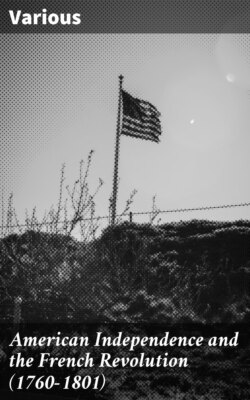Читать книгу American Independence and the French Revolution (1760-1801) - Various - Страница 6
На сайте Литреса книга снята с продажи.
To George Montagu, Esq., Strawberry Hill, July 22, 1761.
ОглавлениеTable of Contents
For my part, I believe Mademoiselle Scuderi drew the plan of this year. It is all royal marriages, coronations and victories; they come tumbling so over one another from distant parts of the globe, that it looks just like the handy-work of a lady romance writer, whom it costs nothing but a little false geography to make the great Mogul in love with a princess of——, and defeat two marshals of France as he rides post on an elephant to his nuptials. I don’t know where I am. I had scarce found Mecklenburgh Strelitz with a magnifying glass, before I am whisked to Pondicherri—well, I take it, and raze it. I begin to grow acquainted with Colonel Coote, and to figure him packing up chests of diamonds, and sending them to his wife against the King’s wedding—thunder go the Tower guns, and behold Broglio and Soubise are totally defeated; if the mob have not much stronger heads and quicker conceptions than I have, they will conclude my lord Granby is become nabob. How the deuce in two days can one digest all this? Why is not Pondicherri in Westphalia? I don’t know how the Romans did, but I cannot support two victories every week. Well, but you will want to know the particulars. Broglio and Soubise, united, attacked our army on the fifteenth, but were repulsed; the next day, the prince Mahomet Alli Cawn—no, no, I mean prince Ferdinand, returned the attack, and the French threw down their arms, and fled, run over my lord Harcourt, who was going to fetch the new queen; in short, I don’t know how it was, but Mr. Conway is safe, and I am as happy as Mr. Pitt himself. We have only lost a lieutenant-colonel Keith; colonel Marlay and Harry Townshend are wounded. … I dined with your secretary yesterday; there were Garrick and a young Mr. Burke, who wrote a book in the style of lord Bolingbroke, that was much admired. He is a sensible man, but has not worn off his authorism yet, and thinks there is nothing so charming as writers, and to be one. He will know better one of these days. I like Hamilton’s little Marly; we walked in the great allée, and drank tea in the arbour of treillage; they talked of Shakspeare and Booth, of Swift and my lord Bath, and I was thinking of Madame Sévigné. Good night! I have a dozen other letters to write; I must tell my friends how happy I am—not as an Englishman, but as a cousin.
Yours ever.
